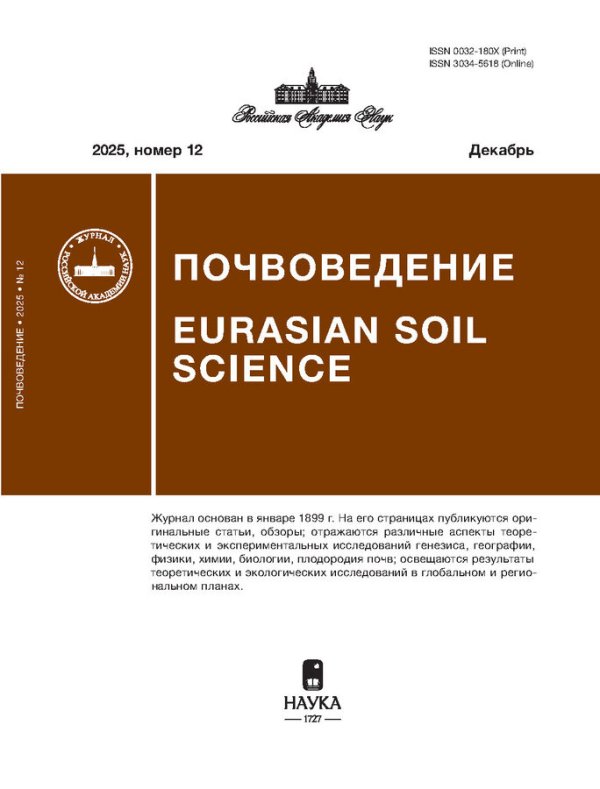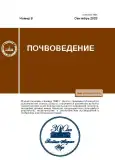Carbon Dioxide Emission from the Soil Surface of the 10-Year Felled Area of the Pine Forest in the European North-East of Russia
- Authors: Osipov A.F.1
-
Affiliations:
- Institute of Biology of Komi Science Centre of the Ural Branch, Russian Academy of Sciences
- Issue: No 9 (2023)
- Pages: 1049-1058
- Section: ДЫХАНИЕ ПОЧВ В ПРИРОДНЫХ ЦЕНОЗАХ
- URL: https://journals.rcsi.science/0032-180X/article/view/138181
- DOI: https://doi.org/10.31857/S0032180X23600087
- EDN: https://elibrary.ru/DXJQJP
- ID: 138181
Cite item
Full Text
Abstract
Experimental data on soil respiration are need for estimating role of industrial logging on carbon cycle of forest ecosystems. Investigations were carried out during snowless periods 2019–2021 years on felled area of pine forest 10 years after clear cutting (Komi Republic, Russia). The soil type is a Gleyic Folic Albic Podzol (Arenic). Emission CO2 was measured by LI COR 8100. The characteristic of weather conditions and soil temperature dynamic at 10 cm depth were given. The weather conditions were strongly influenced on soil respiration rate. More intensive CO2 flux from soil surface was observed in warm summer with insufficient precipitation. The mean month CO2 emission was less by 1.3–1.9 times in apiaries, parts of felled area with low soil cover damages, comparing to skidding tracks where logged trees were extracted. The significant positive correlation (R2 = 0.12–0.86) was detected between soil temperature at 10 cm depth and soil respiration investigated technological elements. A reliable interrelation between CO2 flux and moisture of forest floor was observed in skidding tracks in a year with abundant precipitation while in a dryer year it wasn’t. It is differ from apiaries where found reverse dependencies. Apiaries emitted in atmosphere 303–379 g С m–2 with soil respiration during snowless period, skidding tracks – 419–573 g С m–2 which is 60–75 tons of CO2 in terms of the area of the entire felled area (5 ha). The growing season formed most part (86–90%) of carbon efflux from May to October and input of summertime was 56–65%. The data obtained will serve to determine the role of timber harvesting in the carbon cycle of taiga forests.
About the authors
A. F. Osipov
Institute of Biology of Komi Science Centre of the Ural Branch, Russian Academy of Sciences
Author for correspondence.
Email: osipov@ib.komisc.ru
Russia, 167982, Syktyvkar
References
- Атлас Республики Коми / Отв. ред. Корниенко Е.В. М.: Феория, 2011. 448 с.
- Бобкова К.С. Биологическая продуктивность хвойных лесов европейского Северо-Востока. Л.: Наука, 1987. 156 с.
- Бобрик А.А., Гончарова О.Ю., Матышак Г.В., Рыжова И.М., Макаров М.И., Тимофеева М.В. Распределение компонентов углеродного цикла почв лесных экосистем северной, средней и южной тайги западной Сибири // Почвоведение. 2020. № 11. С. 1328–1340.
- Государственный доклад “О состоянии окружающей среды Республики Коми в 2019 году”. Сыктывкар: Министерство природных ресурсов и охраны окружающей среды Республики Коми, 2020. 162 с.
- Государственный доклад. О состоянии и об охране окружающей среды Российской Федерации в 2019 г. М.: Минприроды России, 2020. 1000 с.
- Громова М.С., Матвиенко А.И., Макаров М.И., Ченг Ш.К., Меняйло О.В. Температурная чувствительность (Q10) базального дыхания как функция количества доступного углеродного субстрата, температуры и влажности // Почвоведение. 2020. № 3. С. 366–371.
- Дымов А.А. Влияние сплошных рубок в бореальных лесах России на почвы (обзор) // Почвоведение. 2017. № 7. С. 787–798.
- Замолодчиков Д.Г., Грабовский В.И., Шуляк П.П., Честных О.В. Влияние пожаров и заготовок древесины на углеродный баланс лесов России // Лесоведение. 2013. № 5. С. 36–49.
- Карелин Д.В., Почикалов А.В., Замолодчиков Д.Г., Гитарский М.Л. Факторы пространственно-временной изменчивости потоков СО2 из почв южнотаежного ельника на Валдае // Лесоведение. 2014. № 4. С. 56–66.
- Молчанов А.Г., Курбатова Ю.А., Ольчев А.В. Влияние сплошной вырубки леса на эмиссию СО2 с поверхности почвы // Известия РАН. Сер. Биологическая. 2017. № 2. С. 190–196.
- Осипов А.Ф. Выделение углерода с поверхности почвы спелого сосняка черничного средней тайги Республики Коми // Почвоведение. 2016. № 8. С. 982–990.
- Осипов А.Ф. Влияние межгодовых различий метеорологических характеристик вегетационного периода на эмиссию СО2 с поверхности почвы среднетаежного сосняка бруснично-лишайникового (Республика Коми) // Почвоведение. 2018. № 12. С. 1455–1463.
- Осипов А.Ф. Влияние сплошной рубки на дыхание почвы среднетаежного сосняка черничного Республики Коми // Лесоведение. 2022. № 4. С. 395–406. https://doi.org/10.31857/S0024114822030111
- Стороженко В.Г. Участие дереворазрушающих грибов в процессах деструкции и формирования лесных сообществ // Хвойные бореальной зоны. 2016. Т. 34. № 1–2. С. 87–91.
- Bond-Lamberty B., Thomson A.M. Temperature-associated increases in the global soil respiration record // Nature. 2010. V. 464. P. 579–582. https://doi.org/10.1038/nature08930
- Bradshaw C.J.A., Warkentin I.G. Global estimates of boreal forest carbon stocks and flux // Global and Planetary Change. 2015. V. 128. P. 24–30. https://doi.org/10.1016/j.gloplacha.2015.02.004
- Čater M., Darenova E., Simončič P. Harvesting intensity and tree species affect soil respiration in uneven-aged Dinaric Forest stands // Forest Ecology and Management. 2021. V. 480. 118638. https://doi.org/10.1016/j.foreco.2020.118638
- Cornwell W.K., Cornelissen J.H.C., Allison S.D., Bauhus J., Eggleton P., Preston C.M., Scarff F., Weedon J.T., Wirth C., Zanne A.E. Plant traits and wood fates across the globe: rotted, burned, or consumed? // Global Change Biology. 2009. V. 15. P. 2431–2449. https://doi.org/10.1111/j.1365-2486.2009.01916.x
- Davidson E.A., Janssens I.A., Luo Y. On the variability of respiration in terrestrial ecosystems: moving beyond Q10 // Global Change Biology. 2006. V. 12. P. 154–164. https://doi.org/10.1111/j.1365-2486.2005.01065.x
- FAO. Global forest resources assessment 2010. FAO, Rome, 2010. 122 p.
- https://rp5.ru/Погода_в_Сыктывкаре.
- Ivanov D., Tatarinov F., Kurbatova J. Soil respiration in paludified forests of European Russia // J. Forestry Res. 2020. V. 31. P. 1939–1948. https://doi.org/10.1007/s11676-019-00963-4
- Korkiakoski M., Tuovinen J.P., Penttila T., Sarkkola S., Ojanen P., Minkkinen K., Rainne J., Laurila T., Lohila A. Greenhouse gas and energy fluxes in a boreal peatland forest after clear-cutting // Biogeosciences. 2019. V. 16. P. 3703–3723. https://doi.org/10.5194/bg-16-3703-2019
- Kurganova I., Lopes de Gerenyu V., Khoroshaev D., Myakshina T., Sapronov D., Zhmurin V. Temperature sensitivity of soil respiration in two temperate forest ecosystems: the synthesis of a 24-year continuous observation // Forests. 2022. V. 13. P. 1374. https://doi.org/10.3390/f13091374
- Lindroth A., Holst J., Heliasz M., Vestin P., Lagergren F., Biermann T., Cai Z., Mölder M. Effects of low thinning on carbon dioxide fluxes in a mixed hemiboreal forest // Agricultural and Forest Meteorology. 2018. V. 262. P. 59–70. https://doi.org/10.1016/j.agrformet.2018.06.021
- Masyagina O.V., Evgrafova S.Y., Menyailo O.V., Mori S., Koike T., Prokushkin S.G. Age-dependent changes in soil respiration and associated parameters in Siberian permafrost Larch stands affected by wildfire // Forests. 2021. V. 12. P. 107. https://doi.org/10.3390/f12010107
- Mukhortova L., Schepaschenko D., Moltchanova E., Shvidenko A., Khabarov N., See L. Respiration of Russian soils: Climatic drivers and response to climate change // Sci. Total Environ. 2021. V. 785. P. 147314. https://doi.org/10.1016/j.scitotenv.2021.147314
- Novakovskiy A.B., Elsakov V.V. Hydrometeorological Database (HMDB) for Practical Research in Ecology // Data Sci. J. 2014. V. 13. P. 57–63. https://doi.org/10.2481/dsj.IFPDA-10
- R Core Team. R: A language and environment for statistical computing. R Foundation for Statistical Computing. Vienna, 2020. https://www.R-project.org/.
- Yamulki S., Forster J., Xenakis G., Ash A., Brunt J., Perks M., Morison J.I.L. Effects of clear-fell harvesting on soil CO2, CH4, and N2O fluxes in an upland Sitka spruce stand in England // Biogeosciences. 2021. V. 18. P. 4227–4241. https://doi.org/10.5194/bg-18-4227-2021
Supplementary files














